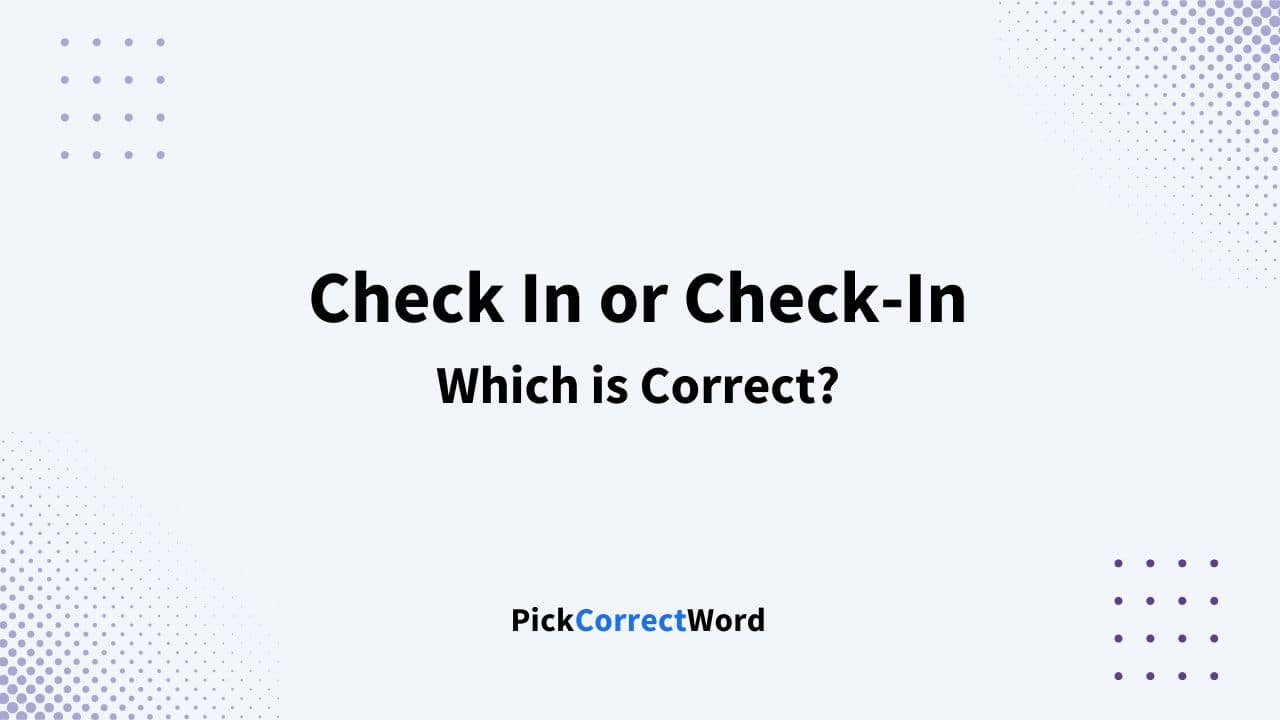Knowing when to use check in or check-in can make your sentences clearer. Neither is incorrect, but they do have different uses.
When you check in, you’re doing something like registering at a hotel or making sure someone is okay.
On the other hand, “check-in” refers to the spot where you perform this action, like the reception desk at a hotel, or the specific time you’re supposed to show up somewhere.
Check In or Check-In: Which is Correct?
Both “check in” and “check-in” are correct, but you use them differently.
“Check in” is a verb. It’s what you do when you arrive somewhere and need to register, or when you want to confirm you’re present.
“Check-in” is used as a noun or adjective. It’s about the process of checking in – like the check-in counter at an airport, the check-in gate, or the time you need to check in.
Example of Each:
- Verb: “Please check in at the front desk when you arrive.”
- Noun/Adjective: “You will find your boarding pass at the check-in counter.”
So, remember this: use “check in” when you’re talking about doing the action, and “check-in” when you’re referring to the place or time of the action.
Check In: Meaning and Usage
“Check in” refers to the act of signing in at a location or letting others know you’ve arrived. It describes an action or process.
For example, if you say, “I need to check in at the hotel by 6 PM,” you’re using “check in” as a verb that outlines your plan.
As a verb, “check in” should always be two separate words. Whether you’re discussing arriving at a location or announcing your presence, it’s all about the action you’re performing.
Check-In: Meaning and Usage
“Check-in” is all about the process of signing in when you get to a place like a hotel or airport. It’s a set procedure you follow to indicate you’re there.
When you use “check-in” with a hyphen, it can be both a thing (noun) and a description (adjective).
As a noun, “check-in” could mean the action itself or the spot where you sign in. As an adjective, it adds more information about another thing, like in “check-in counter.”
Examples of Using “Check In“ in A Sentence
“We need to check in at the airport two hours before our flight.“
“Can you check in with your project manager about the status of the report? “
“Make sure to check in at the front desk for your appointment.“
“I’ll check in with you later to see how you’re feeling.“
“The hotel requires all guests to check in before 10 PM.“
“Please check in at the conference registration when you arrive.“
“It’s important for remote workers to check in with their teams regularly.“
“You have to check in at the main gate before entering the concert area.“
“Let’s check in at the rental office before we head to the vacation home.“
“After you check in at the clinic, please take a seat in the waiting area.“
Examples of Using “Check-In“ in A Sentence
“Ensure you complete your online check-in 24 hours before your flight.“
“During hotel check-in, present your identification at the reception.“
“Your workstation requires a daily check-in for security purposes.“
“At the conference, head to the check-in table to receive your badge.“
“Please do a quick check-in with your team leader every morning.“
“Your luggage can be left at the check-in counter before boarding.“
“Remember, campers must go through check-in upon arrival at the site.“
“The check-in process for the event starts promptly at 8 AM.“
“When you arrive, your first stop should be at patient check-in.“
“Complete your gym check-in at the kiosk to track your visits.“
Frequently Asked Questions
Can You Use Check In and Check-In Interchangeably?
No, check in and check-in are not interchangeable. Your choice depends on their usage as a verb or noun/adjective in a sentence.
In what Situations is it appropriate to use the hyphenated ‘check-in’?
The hyphenated “check-in” can be used when referring to the process or location of registration, such as a “check-in desk” or “check-in time.”
How does ‘check in’ differ from ‘check out’ in terms of usage and meaning?
“Check in” implies the act of registering upon arrival, initiating your stay or presence at a location. In contrast, “check out” conveys the act of leaving a place, settling accounts, or borrowing items like library books. The two terms mark the beginning and end of an engagement or stay.


